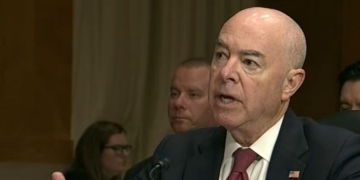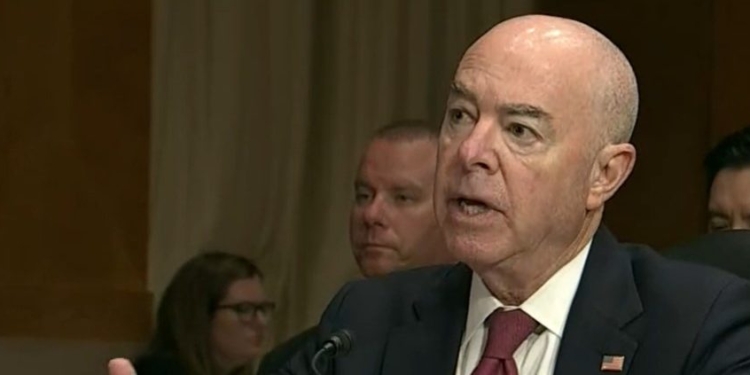The Biden-Harris administration announced protected status for thousands of Lebanese nationals residing in the United States on Thursday, giving them certain deportation protections and work authorization.
Lebanese nationals currently living in the U.S. will be eligible for Temporary Protected Status (TPS), the Department of Homeland Security (DHS) confirmed in a press release. The new designation will last for 18 months, providing up to 11,000 Lebanese with work authorization and certain reprieve from returning to their home country as fighting between Israel and the Hezbollah terrorist group intensifies.
The designation follows the Biden-Harris administration’s efforts to bring in other foreign nationals into the U.S. en masse on largely humanitarian grounds. The CHNV program — which pertains to Cubans, Haitians, Nicaraguans and Venezuelans — has paroled more than half a million non-citizens into the U.S. since it was launched, according to DHS.
The White House has also paroled roughly 77,000 Afghan nationals into the U.S. after its botched military withdrawal from the country in 2021, with a watchdog report finding that many of them were not properly vetted.
“After consultation with interagency partners, Secretary Mayorkas is announcing a new TPS designation for Lebanon for 18 months due to ongoing armed conflict and extraordinary and temporary conditions in Lebanon that prevent nationals of Lebanon from returning in safety,” the DHS statement reads. “Those approved for TPS will be able to remain in the country while the United States is in discussions to achieve a diplomatic resolution for lasting stability and security across the Israel-Lebanon border.”
Hamas and Israel have been at war since the Oct. 7, 2023 massacre. Fighting in the region has only intensified after Hezbollah, a Lebanon-based terrorist organization, ratcheted up attacks against Israel, prompting Israeli forces to embark on a ground operation in the country.
Beyond Hezbollah, the State Department has confirmed the presence of Hamas, ISIS and the Palestinian Islamic Jihad in Lebanon. Everyday Lebanese may also hold extremists views, with a survey conducted by a Lebanese newspaper finding roughly 80% of the population supported the Oct. 7 Hamas massacre against Israelis.
DHS can designate TPS for a foreign nation that is experiencing conflict or any type of humanitarian disaster, preventing their citizens in the U.S. from returning home safely, according to U.S. Citizenship and Immigration Services. There are currently 16 countries with unexpired TPS, resulting in approximately 860,000 non-citizens with TPS currently residing in the U.S., according to the American Immigration Council.
President Joe Biden had been facing mounting pressure by congressional Democrats to give TPS to Lebanese nationals and to provide details on Deferred Enforcement Departure (DED) for them — details of which DHS also unveiled on Thursday.
The TPS designation not only applies to Lebanese nationals living in the U.S. since Wednesday, but also to individuals with no nationality that last “habitually resided” in Lebanon, according to DHS. The administration is also providing relief to Lebanese students in the U.S., allowing them to apply for work and take fewer school hours.
DHS expects that around 11,000 Lebanese will be eligible for TPS and DED, and another 1,700 Lebanese students may be eligible for student relief.
While DHS announced this temporary status designation to last for 18 months, it will remain to be seen if the designation will be renewed. TPS has long been criticized for being temporary-in-name only, with numerous countries having their TPS designation extended again and again throughout the years.
(Featured Image Media Credit: Screen Capture/CSPAN)
All content created by the Daily Caller News Foundation, an independent and nonpartisan newswire service, is available without charge to any legitimate news publisher that can provide a large audience. All republished articles must include our logo, our reporter’s byline and their DCNF affiliation. For any questions about our guidelines or partnering with us, please contact [email protected].



























 Continue with Google
Continue with Google